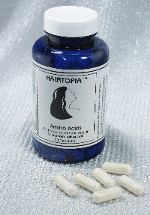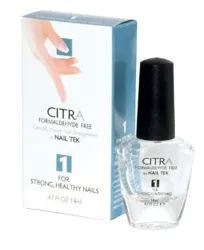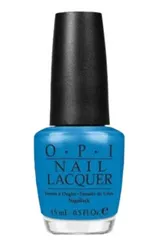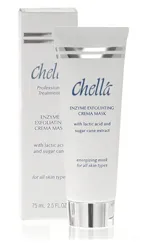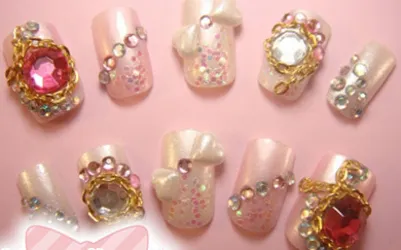
MSM For Healthy Hair, Nails & Skin
Introduction
When we created the new HairTopia vitamin at HairBoutique.com we discussed the pros and cons of adding MSM to the formula with many different experts. It was highly recommended by the chemists that we consulted with that we add MSM to the formula because it has been proven to really help with hair growth.
So what exactly is MSM? Official MSM is Methylsulfonylmethane. Quite simply MSM is a food that comes from the ocean, is water soluble, and is not a drug, or a food additive. MSM is the 3rd largest ingredient found in the human body. MSM is a natural form of organic sulfonyl sulfur compound that is found in the fluid of all living organisms. It is present in a variety of foods, including most fresh raw fruits and green vegetables, milk, meat, seafood, and some grains. It is also found in many common beverages such as milk, coffee and tea. It is, in essence, a pure white, odorless, essentially tasteless, water-soluble crystalline solid sulfur powder.
Why does MSM help with the development of longer and stronger hair? Various scientific studies have proven that MSM contributes a definite normalizing effect on body functions. The sulfur normally provided to the body by MSM is required for healthy collagen and keratin which are essential for healthy hair, skin and nails. MSM also has proven antioxidant benefits which can disrupt or alter damaging chain reactions of lipid peroxidation in the cell membranes. MSM is considered to be one of the safest substances in biology, similar in toxicity to water. MSM and its related compounds are the source of 85 percent of the sulfur found in all living organisms. Many researchers believe that sulfur, is a sorely neglected mineral nutrient and plays an indispensable role in human nutrition. MSM is volatile and is easily lost during even moderate processing. Cooking, drying, smoking, pickling, and long-term storage can deplete the MSM content of food. Unless the human diet is composed primarily of raw foods, it is unlikely that sufficient MSM will be ingested to significantly contribute to the nutritional sulfur requirement. MSM Sulfonyl Is SafeSulfonyl Sulfur, which is a key ingredient of MSM, should not be confused with other ingredients like sulfa, sulfite or sulfate. Sulfa, sulfite and/or sulfate are harmful derivatives of the sulfur family which the body does not need and is not in any way included in MSM. Sulfa is used in wounds to burn and cauterize while sulfites are put in common foods to prevent the bugs from eating them, and sulfates are used in lunch meats and sausages to preserve them. Some people may be allergic to sulfa's, sulfites, and sulfates which are part of the sulfur family like MSM. The sulfonyl in MSM is nutritional, and it is extremely rare that humans are ever allergic to it. Remember, all human bodies require MSM. What Is DMSO?MSM should also not be confused with DMSO. Although MSM and DMSO have some similarities, they are also unique in the benefits that they provide. MSM is DMSO without the bad smelling chemical D1-Methyl. Research chemist Robert Herschler discovered how to oxidize DMSO, causing MSM to crystallize becoming pure and stable. This process made it possible to store MSM and use as needed without the bad taste or smell. The body uses MSM to create new healthy cells. Vitamins and amino acids work with MSM to repair and create these healthy cells. Without proper levels of MSM, our bodies are unable to build good healthy cells, and this can lead to all sorts of illness. To maintain good health, we need good flexible, healthy cells. Illness is the result and consequence of a body deficient of materials needed to repair damaged tissue and organs. To fight this deterioration process we must supplement our diets with MSM to provide the body with the proper building materials to maintain a healthy body. New Cells 24 Hours A DayMSM has been proven to be rapidly metabolized by the body. Sulfur is found in all tissues measured within 24 hours of oral ingestion. The majority of unused and metabolized MSM occurs within 95-100 hours following ingestion, although measurable quantities have been reported in urine 400-450 hours. Sulfur has a rapid turnover in the body. Therefore it is very important to be sure that sulfur be replenished on a regular basis. If our body doesn't receive the proper nutrition and the building materials it needs, it will produce unhealthy, dysfunctional cells that are deficient in the basic ingredients that constitute a healthy cell. The human body is amazing and always tries to heal itself, but with deficient materials, it draws from other resources, and usually takes what it needs from other parts of the body. If we give the body what it needs to heal itself, it will repair damaged parts and become healthy again. If we want a good flexible cell, capable of maintaining good health, we need to supplement our diets with MSM, to enable the body to heal itself. Contrary to popular belief, you do not have to take vitamin C along with MSM to make it work. If you are unable to take vitamin C, MSM will still work for you. No Overdose With MSM.The body will use what it needs, and after twelve hours, will flush any excess amounts out of the body. If you want to maintain good healthy cells 24 hours a day, it is suggested you take MSM in the morning and evening. The MSM will flush what the body doesn't retain semi-permanently every twelve hours, and because it is a free radical and foreign protein scavenger. MSM cleans the blood stream, so allergies to food and pollens go away in about 3 or 4 days. Toxicity studies completed on MSM demonstrated that the compound is remarkably non-toxic. Extremely high dosages, up to 2,000 mg/kg, were utilized for measurement purposes in the toxicity research with no adverse reaction measured. No Known Side EffectsAcute, intermediate, and long term studies indicate that MSM exhibits very low toxicity, by any route of administration. In fact, MSM has a toxicity profile similar to that of glycerin and water. Aqueous solutions of MSM have been used as safe blood dilutents, demonstrating it to be nonallergenic, nonpyretic, and without adverse pharmacological effect. MSM has been widely used as a dietary supplement without any reports of allergy or intolerance related to its use. Supplements of MSM are comfortably assimilated without side effects. There are no known contraindications. MSM is odorless and does not produce intestinal gas or body odor which may occur with some other forms of sulfur. HairTopia & MSMThe only side effects of taking MSM alone, or with other supplements like HairTopia, are stronger nails, softer skin and faster growing hair. This is because with MSM you have access to more sulfur. The sulfur normally provided to the body by MSM is required for healthy collagen and keratin which are essential for healthy hair, skin and nails. Healthy hair is stronger hair and hair that can achieve its natural genetic growth patterns. SummaryThe body knows what it needs better than any doctor. It will use MSM where it is needed. Even if your body is experiencing more than one problem... give it a little extra MSM so it can provide more nutrition and heal itself. Three U.S. Patents have been issued on methylsulfonylmethane. The first patent (U.S. Patent No. 4,296,130) was issued in 1981 for the use of cosmetic preparations. In 1985 and 1986, two additional patents (U.S. Patent No. 4,514,421 and 4,616,039) were issued on the dietary and pharmaceutical uses of MSM. Nutritional supplements containing this patented, licensed form of MSM have been available commercially since 1986. |
| If you want to talk more about this or other hair care articles on HairBoutique.com or anywhere else, please post a message on HairBoutique.com's Hair Talk Forums.
|
Social Media Network Information
Please follow us on Twitter at: https://Twitter.com/HairBoutique. I look forward to meeting new people from all walks of Twitter and learning from their Tweets.


 You may have heard about MSM. After all, its value as a "super nutrient" has generated some buzz over the past few years. Earl L. Mindell, R.Ph, Ph.D and author of Earl Mindell's Vitamin Bible has dedicated an
You may have heard about MSM. After all, its value as a "super nutrient" has generated some buzz over the past few years. Earl L. Mindell, R.Ph, Ph.D and author of Earl Mindell's Vitamin Bible has dedicated an 